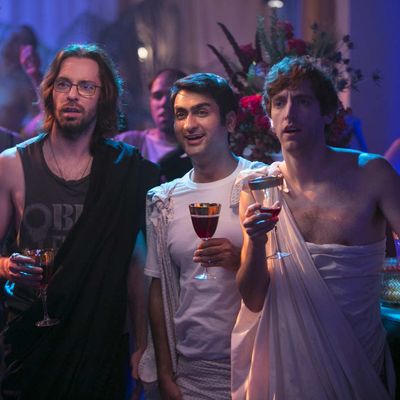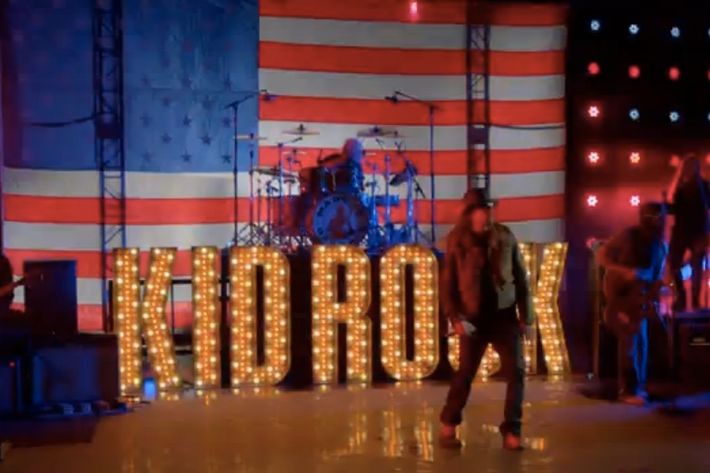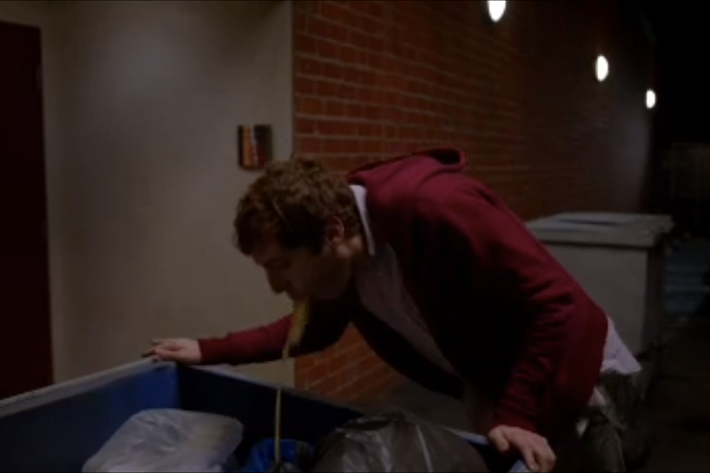
Recently, the cultural blogosphere went nuts over a film criticism video, ÔÇ£First and Final Frames,ÔÇØ which juxtaposes the opening and closing shots of critically acclaimed films. The thesis of ÔÇ£First and Final FramesÔÇØ proposes that by understanding the first and last shots of these films, we can better understand what directors are trying to do with their work as a whole.
With this in mind, letÔÇÖs talk about the first season of Silicon Valley, whose first shot shows a tech party, and whose final shot shows a tech entrepreneur vomiting.
To recap: The party in the opening scene is thrown by a friend of one of the four start-up builders at the center of the show; the friend has just sold his company to Google for hundreds of millions of dollars, and now heÔÇÖs throwing a party headlined by Kid Rock.

Months elapse before we arrive at the climactic puking scene: Pied Piper triumphs over a rival piece of software at a high-profile tech competition, setting them up for ÔÇö well, perhaps a sale to Google for hundreds of millions of dollars, making them all as rich as the Kid Rock party-thrower from episode one.
And then Richard runs outside and vomits into a trash can. Roll credits. End of season.

Partying and vomiting might not sound persuasive as major themes of Silicon Valley, but itÔÇÖs an apt framework to bear in mind as we head into season two. In the spirit of radical disruption and unexpected pivots, IÔÇÖd like to argue that partying and vomiting are, at least as metaphors, at the heart of both Silicon Valley, the show, and of Silicon Valley, the place it lampoons. Partying and vomiting represent the two true outcomes for code-slinging, empire-building entrepreneurs in the Valley: For the showÔÇÖs protagonists, there exists no livelihood in between unimaginable wealth and total, penurious failure.
ThatÔÇÖs pretty consistent with the methodology in previous comedies from Mike Judge: His satire works via hyperbole, rather than pinpoint observation. And so Silicon Valley offers dueling, exaggerated visions of Silicon Valley: Party Silicon Valley and Vomit Silicon Valley. You either achieve success with your start-up and enjoy Party Silicon Valley, attending VC-funded toga parties with Flo Rida performing, or your start-up bombs and you end up in Vomit Silicon Valley, pitching your doomed app to customers at the liquor store where youÔÇÖre a stock boy.
Silicon Valley is, mostly, a story about and satire of Party Silicon Valley, and the wannabes on the outside of the party looking in. The stripper who takes payments via Square; the graffiti artist who creates start-up logos for tens of thousands of dollars; the prepubescent code ninja who will swoop in to save your project, for a fat check made out to his parents ÔÇö this is all Party Silicon Valley, potent symbols of an economy and a culture in ascendance.
Vomit Silicon Valley, meanwhile, always lurks in the shadows. It is the fate that awaits Pied Piper if, or when, they fail. Nausea is the physical manifestation of digital ailments: low download counts, poor user retention, a marketing blitz by a well-funded competitor, the uncertainty of new entrants.
Sometimes the two intersect: One of the defining characteristics of Party Silicon Valley is, in fact, vomitÔÇö Word Vomit. Think of the way that English is digested and regurgitated by the showÔÇÖs many charlatans and venture-funded con men in the pursuit of fortunes: While Richard struggles to elucidate his start-upÔÇÖs mission, other Valley entrepreneurs elide vowels and append -lys to name their start-ups, and claim, ad nauseam, to want to ÔÇ£change the world.ÔÇØ (Vomit.)
This tech logorrhea is contagious, and like many of the characters and situations on the show, has its own basis in reality. Consider a recent company-wide memo written by Evan Spiegel, the CEO of Snapchat. After bemoaning press coverage of some leaked internal emails amid the Sony hacks, Spiegel concludes his (public) missive with an inspiring marching order for his troops: ÔÇ£WeÔÇÖre going to change the world because this isnÔÇÖt the one we want to be living in,ÔÇØ Spiegel writes. A reminder that this is coming from the CEO of Snapchat, an app that lets you doodle on selfies.
Spiegel is living in real-life Party Silicon Valley; his story, like his utopianism, echoes many of the plot points on the show. Last year he turned down a $3 billion buy out offer from Facebook in order to grow Snapchat independently; Facebook, in turn, created an in-house version of the app, in hopes of quashing it before it got too big. Snapchat, like Pied Piper, won; FacebookÔÇÖs Slingshot, like HooliÔÇÖs Nucleus, lost. You could forgive Mark Zuckerberg if he feels some indigestion whenever he receives a new Snap.
Season one of Silicon Valley ends with the promise of zillions of dollars in Pied PiperÔÇÖs future, and that soon they┬áwould be the ones hiring Shakira to play their press conferences. As Monica says in a key nausea-inducing moment, ÔÇ£this is when it really starts.ÔÇØ Season two of Silicon Valley┬ábegins on Sunday. The parties will be bigger. So too, presumably, will the vomit.
Jason Gilbert is a senior editor at Yahoo Tech.

